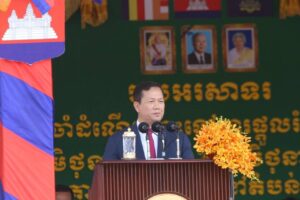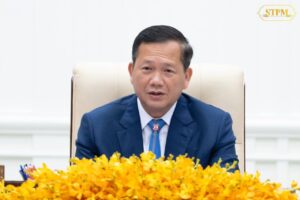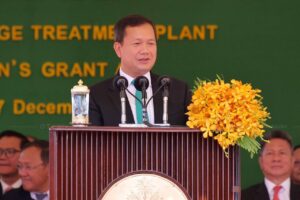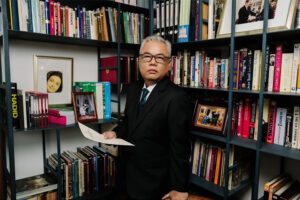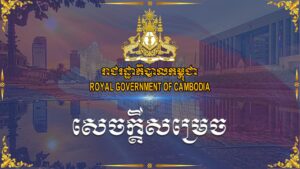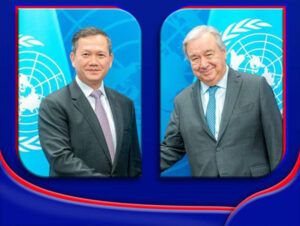(Video) Keynote Address of Samdech Thipadei Hun Manet at the Opening of the 12th General Assembly of International Conference of Asian Political Parties (ICAPP) and Related Meetings: “A Quest for Peace and Reconciliation”
- Samdech Techo HUN Sen, President of the CPP, and President of the Senate of the Kingdom of Cambodia;
- Honorable Chung Eui-yong, Chairman of ICAPP Standing Committee
- Honorable Heads of Political Parties;
- Honorable delegates, Excellencies, Ladies and Gentlemen!
I stand here today with a deep sense of humility in front of this august body of political leaders representing many political parties in the Asia Pacific, Africa, Latin America and Europe. It is indeed an honor for me to have this opportunity to raise a very important topic of the moment in world affairs for your reflections and actions. Here, I refer to the pressing need to seek peace and reconciliation.
Our global community finds itself at an inflection point. The foundations of peace, built upon the principles enshrined in the UN Charter since the end of the Second World War, are being tested to the limits by intense rivalries.
Today, we are living in an atmosphere of great uncertainty, with great powers challenging the rules-based international order. But world affairs and global governance should not be all about great powers. It is important to recognize that middle powers and small states also possess both the agency and ambition to play meaningful roles in geopolitical and geoeconomics diplomacy to foster peace around the world. My country, Cambodia, is certainly one of them. We are keen to contribute to the building of a global community bound together by peace, prosperity, and inclusive multilateralism.
In this regard, I am pleased that this year, Cambodia has the honor to host the 12th General Assembly of the International Conference of Asian Political Parties (ICAPP) to energize our dialogue on this important topic of peace and reconciliation. ICAPP is well respected for its role as a bridge of political and ideological divides.
In a context of a growingly divisive global politics, I believe that ICAPP will continue to serve as an important channel for political parties to come together under one roof for dialogues and cooperation across our diverse regions.
Excellencies, Ladies and Gentlemen,
Cambodia’s journey is a powerful testament to the transformative impact of national reconciliation following decades of conflicts. Our story of achieving total peace in 1998 and uniting the entire country for the first time in the past 500 years is deeply embedded in our nation and, of course, in the hearts of our people. Strolling down our memory lane, in the midst of the guerilla warfare with the Khmer Rouge forces, it was Samdech Techo Hun Sen who charted a new course for Cambodia by advocating for dialogue and political solutions. Given the level of animosity between the conflicting parties, particularly with the Khmer Rouge, whose regime oversaw millions of Cambodian people killed, the idea of negotiation was purely inconceivable, and yet he had the courage, even if it meant putting his life on the line, to choose the path less traveled in the name of peace and national unity.
The peace dividend that Cambodia has enjoyed over the past 26 years reminds us of how much we have gained through the Win-Win Policy of Samdech Techo HUN Sen. This motivating factor certainly drives our peace activism and our efforts to contribute to the resolution of ongoing conflicts around the world.
Every politician should bear utmost responsibility to peace, and peace should not be secondary to electoral victory or certain ideological goals. Extremism and radicalism should be condemned and not become a ticket to political office. Countries should follow the rule-based international order that promotes peace and refrain from meddling in internal affairs of others, causing unrest, or ultimately bringing about regime change by undemocratic means. It should not be an accepted practice for nations to exploit the vulnerabilities of developing countries by launching smear campaigns, spreading false information, and imposing unilateral sanctions on anyone or any country who does not adhere to a particular geopolitical agenda. Being the past victim of such intoxicated political behavior and international relations, I wish to underline that the CPP stands resolute in defending peace, sovereignty, territorial integrity, and development.
Excellencies, Ladies and Gentlemen!
To sustain peace and nurture an environment of reconciliation, building unity through fostering common understanding is more crucial than ever on key issues underpinning peace and reconciliation, namely: first and foremost, our commitment to the principles and purposes of the UN Charter, with strong emphasis on non-interference, sovereignty, equality, and mutual respect; secondly, deepening inter-faith dialogues to uplift mutual understanding and trust, bearing in mind that political trust is the foundation for peace, reconciliation, and cooperation; and lastly, bridging inter-generational and ideological divides through emphatic dialogue and respect.
I cannot emphasize enough that winning peace requires reconciliation of differences. Peace can only be achieved through peaceful settlement of conflicts, based on dialogue, consultation, and a win-win approach. While strengthening our national defense is our sovereign right, it should not overshadow our commitment to dialogue and peaceful resolution. The peace we cherish must be nurtured every day to sustain it.
I would like to conclude my remarks by stressing that reconciliation with our adversary, as Samdech Techo has proven to us, is a strength, not a weakness. Reconciliation is for those with the wisdom to see a win-win solution to a war, not a surrender.
On that positive and hopeful note, I would like to declare the official opening of the 12th ICAPP General Assembly under the theme “A Quest for Peace and Reconciliation.”
Thank You!

